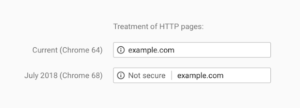10.2019
For over a year (since July 2018), Google Chrome marks sites that do not have a secure SSL connection certificate as “not secure” and unable to establish an encrypted HTTPS connection.
The browser warns the users via an additional notification in the address bar.

Currently, Chrome displays websites on which all network traffic passes through a secure HTTPS connection with the green lock icon and the “safe” sign.
![]()
For many years, Google has warned users against transferring information through public networks in an open way. However, this time, it decided to apply more stringent measures to ensure the security of its users.
The Chrome browser is more than half of the browser market, and these measures will be noticeable for many users and compel website owners to think about security.
What do you do and where do you run?
Is this situation critical to your website? Of course, you shouldn’t be panicking, but you need to act. If you haven’t switched your website to the HTTPS protocol yet, you need to do the following steps.
- Ask your hosting provider if you can install an SSL certificate. For most websites, a free certificate from Let’s Encrypt will suffice. If it is technically possible, immediately set up the certificate. This procedure is simple and takes less than an hour.
- Ask your developers if you can switch your website to the safe mode. This process can take a while, depending on the complexity of your resource, but you should no longer postpone it for later. Usually, for our customers with WordPress CMS, we are all set in 1-2 days.
- After updating the website, we configure redirects so that all your visitors (both old and new) will be automatically redirected to the secure version of the site.
What if you don’t? Google will not block your site and it will be visible. However, danger reports will be annoying for your visitors or customers. Thus, it’s not about far-flung technologies, but rather the real threat of intercepting your customers’ data.
By the way, on August 6, 2014, Google announced that having an https connection site using an SSL certificate affects Google’s search engine ranking.
11.2019
Goldweb Solutions Named a Creative & Design Leader on Clutch
- design
- development
- ui/ux